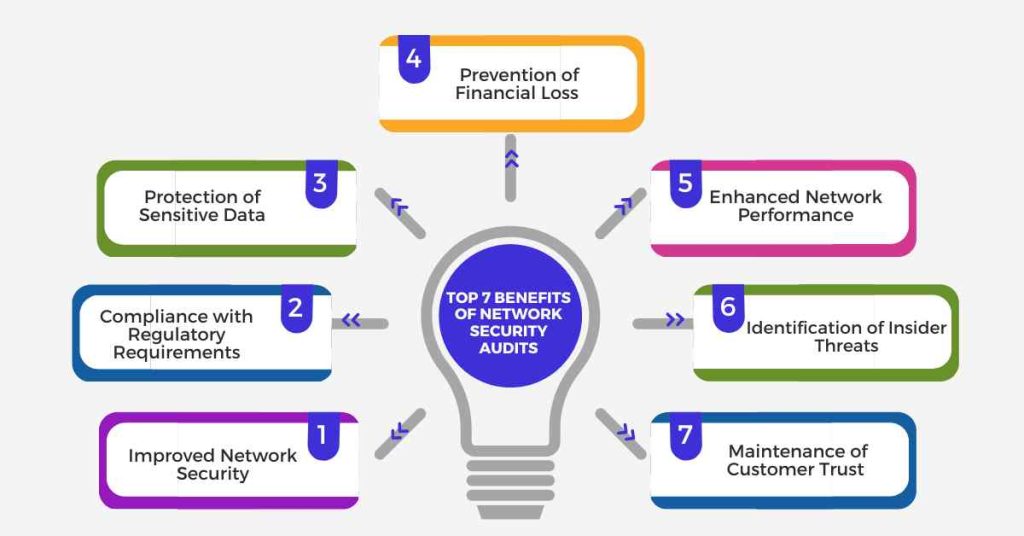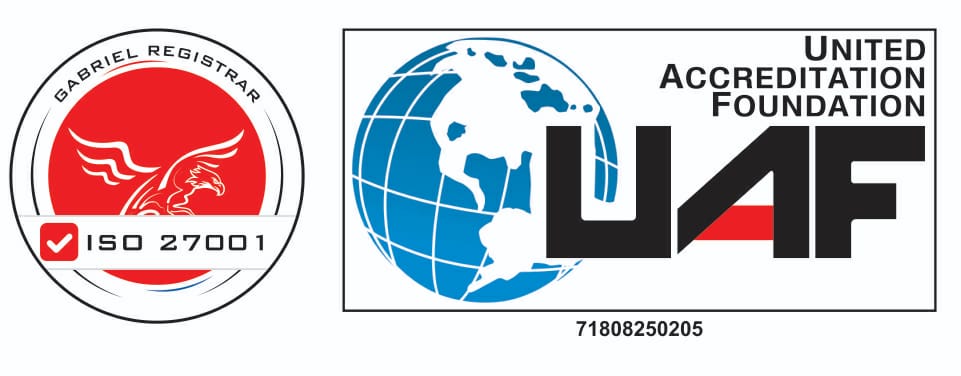Network security has become a top priority for organizations of all sizes. With the increasing number of cyber-attacks and data breaches, it’s crucial to ensure that your network is secure and protected from potential threats.
One effective way to achieve this is by conducting a network security audit. A network security audit is a comprehensive evaluation of an organization’s network security posture, identifying vulnerabilities, weaknesses, and threats that could compromise the integrity of the network.
In this article, we’ll explore the top 7 reasons why a network security audit is conducted, highlighting the importance of this process in maintaining a secure and reliable network infrastructure.
List of Top 7 Reasons Why a Network Security Audit Is Conducted

Here is a List of the Top 7 Reasons Why a Network Security Audit Is Conducted.
1. Identifying Vulnerabilities and Weaknesses
Some of the objectives of the network security audit will include; Some of the purposes for conducting a network security audit will be to; Such weaknesses are capable of being manipulated by attackers, viruses and various enmities resulting in unauthorised access, leakage and disruption.
Thus, a tons network security audit assists an organisation in seeing and discovering raids, which can be taken to change or fix before an attack occurs.
2. Compliance with Regulatory Requirements
Most organizations depend on regulatory rules like the HIPAA, PCI-DSS, and GDPR that need security audits frequently. A network security audit helps organizations to prove conformity with these regulations, and avoid fines, penalties, or detrimental effects to reputation.
3. Protection of Sensitive Data
Businesses and companies gather, maintain, and analyze special information on customer relationships, finances, or other essential company data. A network security audit assists in safeguarding this sort of information from fraudsters or even loss in any way.
4. Prevention of Financial Loss
The effects of cyber threats as well as breaches lead to severe financial consequences for organizations. A network security audit is useful in avoiding such losses because it provides you with a map of the network and reveals the real strengths or weaknesses that hackers may take advantage of.

5. Enhancement of Network Performance
A network security audit can not only involve the discovery of such vulnerabilities and/or weaknesses but also the enhancement of network performance. This means that the audit process includes looking at the current configurations, traffic flow and logged activity and determine what can be done to enhance the situation.
6. Identification of Insider Threats
Employee threat also known as insider threat is a considerable risk to any organization because insiders are employees, and contractors among others. A network security audit enables one to realise insider threats that entail: unlawful penetration, data leakage, and unlawful damaging of an organization.
7. Maintenance of Customer Trust
Finally, a network security audit helps to maintain customer trust and confidence in an organization’s ability to protect sensitive information. By demonstrating a commitment to network security, organizations can build trust with their customers, partners, and stakeholders.
Top 7 Benefits of Network Security Audits

The benefits of network security audits are numerous and include:
1. Improved Network Security
The assessment prevents attackers from exploiting vulnerabilities and demonstrates to organizations that measures need to be taken to protect their networks from such hazards.
2. Compliance with Regulatory Requirements
Network security audits check the compliance of an organization with certain internal or external standard-setting bodies thus avoiding consequences of regulatory noncompliance such as fines and penalties or any other ramifications.
3. Protection of Sensitive Data
Network security audits assist organisations in guarding discrete information against theft and or loss.
4. Prevention of Financial Loss
By conducting network security audits it reduces cases of loss-making as it highlights existing flaws that can easily be exploited by hackers.
5. Enhanced Network Performance
The network security audits assist in the improvement of the network availability, decrease of the transmission latency and the increase of the network bandwidth.
6. Identification of Insider Threats
Insider risks are exposed through network security audits, malicious BSA, unauthorized access to, theft, and sabotage of corporate data.
7. Maintenance of Customer Trust
Such audits assist in the protection of the customer confidence and trust in an organization, in the protection of their information.
Summary
Here is the summary for the blog titled Top 7 Reasons Why a Network Security Audit Is Conducted:
- Identifying Vulnerabilities and Weaknesses
- Compliance with Regulatory Requirements
- Protection of Sensitive Data
- Prevention of Financial Loss
- Enhancement of Network Performance
- Identification of Insider Threats
- Maintenance of Customer Trust
Conclusion
In conclusion, a network security audit is a crucial process that helps organizations identify vulnerabilities and weaknesses, comply with regulatory requirements, protect sensitive data, prevent financial loss, enhance network performance, identify insider threats, and maintain customer trust.
FAQs: Top 7 Reasons Why a Network Security Audit Is Conducted?
1. What is a Network Security Audit?
Ans: A network security audit is a thorough examination of an organization’s network infrastructure to identify vulnerabilities and weaknesses that could be exploited by hackers. The audit checks for compliance with regulatory requirements, protection of sensitive data, prevention of financial loss, and enhancement of network performance.
2. Why is a Network Security Audit Important?
Ans: A network security audit is important because it helps organizations to identify vulnerabilities and weaknesses that could be exploited by hackers. It also helps to ensure compliance with regulatory requirements, protect sensitive data, prevent financial loss, and enhance network performance.
3. What are the Benefits of a Network Security Audit?
Ans: The benefits of a network security audit include improved network security, compliance with regulatory requirements, protection of sensitive data, prevention of financial loss, enhancement of network performance, and identification of insider threats.
4. What is the Difference Between a Network Security Audit and a Vulnerability Assessment?
Ans: A network security audit is a comprehensive examination of an organization’s network infrastructure to identify vulnerabilities and weaknesses, while a vulnerability assessment is a focused evaluation of specific vulnerabilities in a network system. Both are important for maintaining network security, but a vulnerability assessment is a more targeted approach.
5. How Often Should a Network Security Audit Be Conducted?
Ans: A network security audit should be conducted regularly, ideally every 6 months, to ensure that an organization’s network infrastructure remains secure and compliant with regulatory requirements. However, the frequency may vary depending on the organization’s security needs and requirements.
6. Can a Network Security Audit Be Conducted Internally or Does it Require an External Expert?
Ans: Both internal and external experts can conduct a network security audit. However, an external expert can provide a fresh and objective assessment of the network infrastructure, detecting vulnerabilities and weaknesses that may be missed by internal teams.
7. What are the Typical Steps Involved in Conducting a Network Security Audit?
Ans: The typical steps involved in conducting a network security audit include:
1. Scanning the network infrastructure
2. Identifying vulnerabilities and weaknesses
3. Conducting interviews with personnel
4. Analyzing system logs and network traffic
5. Testing security controls and firewalls
6. Providing recommendations for remediation
8. How Long Does a Network Security Audit Typically Take?
Ans: The time it takes to conduct a network security audit can vary depending on the size and complexity of the network infrastructure. Typically, an audit can take anywhere from a few days to several weeks or even months to complete.
9. What is the Cost of Conducting a Network Security Audit?
Ans: The cost of conducting a network security audit can vary depending on the size and complexity of the network infrastructure, the type of audit conducted, and the expertise of the auditor
10. Can a Network Security Audit Help to Prevent a Data Breach?
Ans: Yes, a network security audit can help to prevent a data breach by identifying vulnerabilities and weaknesses that could be exploited by hackers. By addressing these vulnerabilities and weaknesses, an organization can significantly reduce the risk of a data breach and protect sensitive data.












